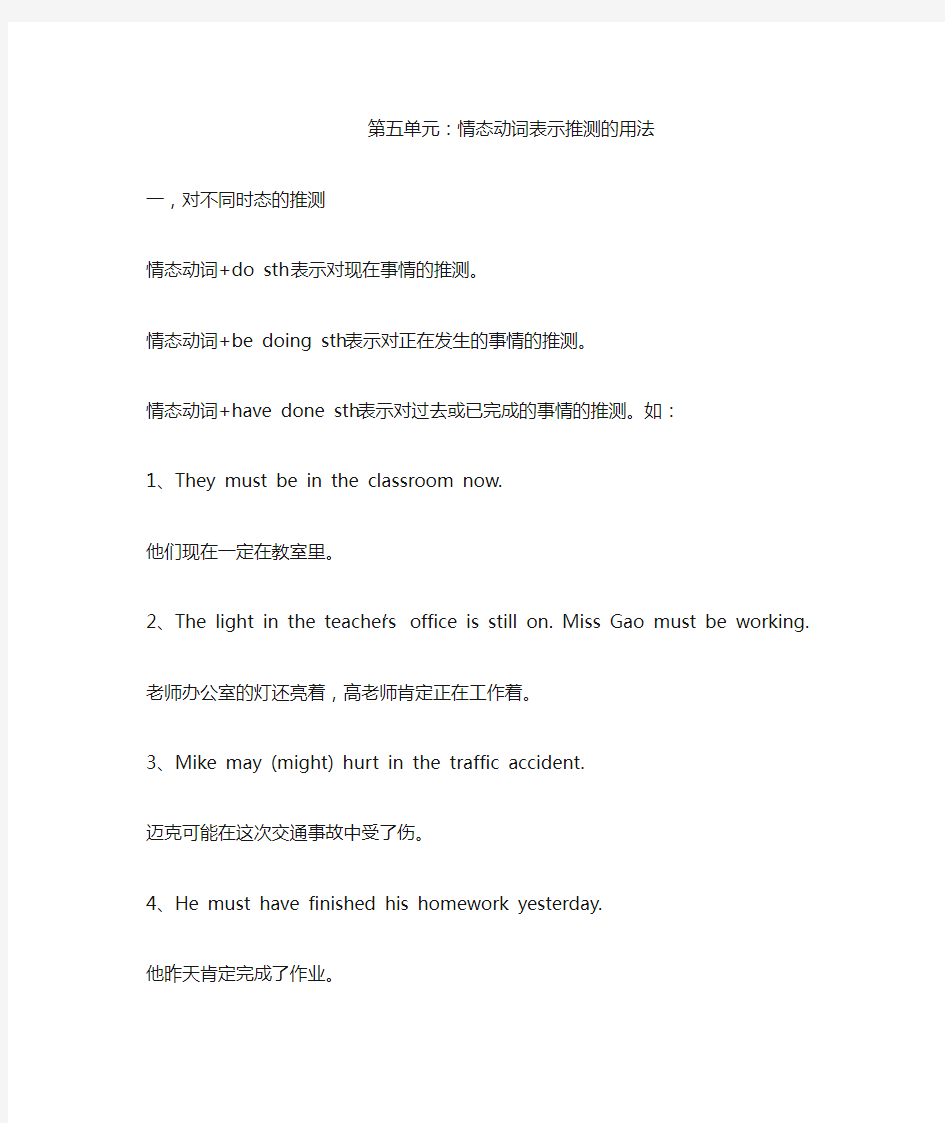
情态动词表示推测的用法
- 格式:doc
- 大小:22.00 KB
- 文档页数:2


第五单元:情态动词表示推测的用法
一,对不同时态的推测
情态动词+do sth表示对现在事情的推测。
情态动词+be doing sth表示对正在发生的事情的推测。
情态动词+have done sth表示对过去或已完成的事情的推测。如:
1、They must be in the classroom now.
他们现在一定在教室里。
2、The light in the teachers’ office is still on. Miss Gao must be working.
老师办公室的灯还亮着,高老师肯定正在工作着。
3、Mike may (might) hurt in the traffic accident.
迈克可能在这次交通事故中受了伤。
4、He must have finished his homework yesterday.
他昨天肯定完成了作业。
二、情态动词表示推测,在不同句型中的用法:
1、在肯定句中,可使用的情态动词有:must, could, may, might,等;其肯定程度逐渐减弱,must表示一种很有把握的推测,意为“一定,肯定”,could/may/might表示一种不太有把握的推测,may意为“可能”,might意为“或许”could意为“可能”,could/may/might在表示推测时,无时态区别,只表示语气差异。如:
(1)You have worked all this week .You must be tired.
你辛苦工作了一周,一定累坏了。
(2)Will you please answer the phone It could /may/might be your mother.
请接一下电话好吗可能是你的母亲打来的。
(3)According to the radio ,it may/might/could rain this evening.
根据广播,今晚可能下雨。
2、在否定句中使用can’t和may not/might not. can’t表示很有把握的否定推测,意为“不可能”;may not/ might not 表示不太有把握的否定推测,意为“可能不”如:(1)She can’t be at school .It’s Sunday today.
她不可能在学校,今天是星期天。
(2)She may not be there today.
今天她可能不在那儿。
(3)I think he might not come.
我认为他可能不来了。
3、在疑问中,一般只用can或could,意为“可能”如:
(1)Who can it be at the door Can it be Tom
门口会是谁呢会不会是汤姆呢
(2)Where could it be
它可能在哪儿呢
三、在表示推测时,反意疑问句的两种情况;
1、对现在进行推测时,反意疑问句中的动词用一般现在时。如:
(1)He must be good at English, isn’t he
(2)You might be watching TV at home ,aren’t you
2、对过去进行推测时,若有明确的、表示过去的时间状语,反意疑问句中的动词用过去式;若没有明确的、表示过去的时间状语,反意疑问句中的动词用现在完成时。如:(1)It must have rained last night , didn’t it
(2)You might have been to the Great Wall, haven’t you
附:belong to的用法
belong to 是动词+介词构成的短语,它表示所属关系,注意其用法:
1、后接某人或某单位名词时,表示某物归属于某人或某单位,这时belong to意为“属
于,为…所拥有”;后接某个家庭,团体、党派、组织、国家等名词时,表示“为…之一成员,与…相关。”
2、它不能用于进行时态,也不能用于被动语态,其主语通常为某物,后常接名词或人称代词的宾格形式,不能接名词性物主代词或名词所有格形式,如:
(1)这台电视机属于谁
Who does this TV set belong to
(2)这间房子下个月将属于我。
The house will belong to me next month.
(3)这辆小汽车是那家医院的。
The car belongs to that hospital.
(4)我是这个游泳俱乐部的成员。
I belong to this swimming club.
(5)她曾经是中国女排的队员。
She belonged to the Chinese Women’s Volleyball Team.
(6)你属于哪个党派
Which Party do you belong to
(7)中国是一个发展中国家,属于第三世界。
China is a developing country belonging to the Third World.
另外,应注意belong to可和名词性物主代词或名词所有格相转换。如:
1、The car belongs to me .
→The car is mine.
2、The new bike belongs to Mike.
→The new bike is Mike’s.
I’m really anxious……
anxious意为“忧虑的;焦虑的,不安的;渴望的;急切希望的”,其后可接about或for,表示“担心……,焦虑……”;还可接动词不定式或that从句。如:
1、飞机突然起飞的时候,我感到非常的焦虑不安。
I was very anxious when the plane suddenly took off .
2、他非常担心他儿子的健康。
He is anxious about / for his son’s health.
3、这位母亲非常担心她的孩子们的安全。
The mother was very anxious about the safety of her children.
4、他渴望很快见到你。
He is anxious to meet you soon.
5、她渴望拥有一辆自己的自行车。
She is anxious to have a bike of her own.
6、她非常渴望能在大学毕业之后找到一份好工作。
She is anxious that she can get a good job after graduating from university.
I think I dropped it ……
比较“落下、掉下”的drop 和 fall
drop可指偶然地丢掉、落下,也可以指有意而为地丢下,多用作及物动词,后直接跟宾语,有时也可作不及物动词。
fall多指地球引力所导致的下落或失去平衡的跌落、掉下,是不及物动词。如:
1、She dropped her glasses and broke them.
2、I dropped the letter in to the postbox.
3、The box fell from the table to the floor.
4、The leaves fall in autumn.
5、The ripe fruit fell/dropped from the tree.
6、Don’t drop the ball on the ground .It’s made of glass.